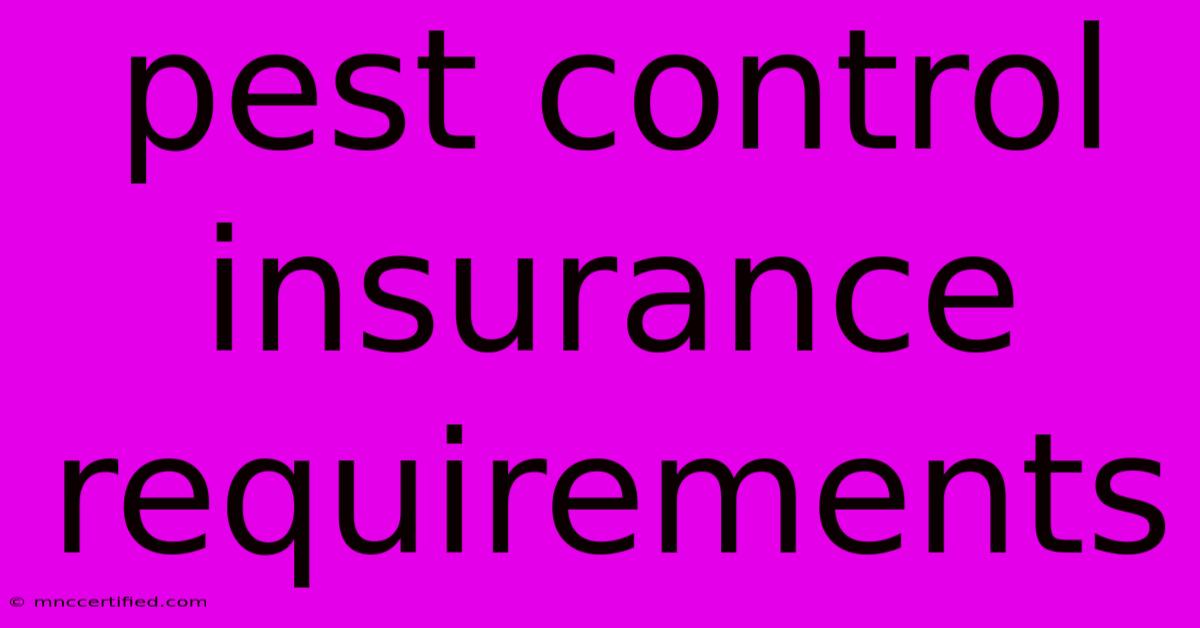Pest Control Insurance Requirements

Table of Contents
Navigating the Maze: Pest Control Insurance Requirements
Starting a pest control business is an exciting venture, but it's crucial to understand the insurance landscape before you start tackling those pesky critters. Just like any other professional service, pest control carries inherent risks, and insurance safeguards your business and your clients.
This guide delves into the essential pest control insurance requirements, helping you navigate the complexities and ensure your business is adequately protected.
Why is Pest Control Insurance Vital?
Imagine this: you're treating a customer's home for termites, and a careless slip results in a minor injury. Or, a misapplied pesticide causes damage to the customer's property. Without insurance, you could face substantial financial losses, potentially crippling your business.
Pest control insurance is a shield against these risks. It provides financial protection for you and your business, ensuring you can continue operating smoothly even when unforeseen events occur.
Key Types of Pest Control Insurance
Navigating the world of insurance can feel overwhelming, but understanding the key types specific to pest control is crucial.
1. General Liability Insurance: This is the cornerstone of any pest control business. It covers damages caused by your business operations, including:
- Bodily Injury: Protecting you against claims from customers or third parties who get injured on your property or due to your services.
- Property Damage: Shielding you from claims arising from damage to your clients' properties during pest control treatments.
- Advertising Injury: Providing coverage for claims stemming from copyright infringement or libel.
2. Workers' Compensation Insurance: If you have employees, this is a legal requirement. It covers medical expenses and lost wages for employees injured on the job.
3. Commercial Auto Insurance: If you use vehicles for your business, this protects you against accidents, theft, and damage to your vehicles.
4. Professional Liability Insurance (Errors & Omissions): This crucial policy protects you against claims arising from errors or omissions in your pest control services. For example, if a treatment fails to eradicate pests as promised, this insurance can help cover the costs of rectifying the situation.
5. Environmental Liability Insurance: This specialized coverage protects you against claims related to environmental damage caused by your pest control operations. This can be particularly important if you use pesticides or herbicides.
Determining the Right Coverage
The specific insurance requirements for your pest control business will depend on factors like:
- State Regulations: States have varying requirements for pest control insurance. Consult your state's licensing board for detailed guidelines.
- Business Size: The larger your business, the more comprehensive your insurance needs will be.
- Services Offered: Specializing in specific pest control services, such as termite control or bed bug eradication, might require additional coverage.
Finding the Right Insurance Partner
Partnering with a reputable insurance broker specializing in pest control businesses is essential. They understand the industry's unique risks and can help you tailor a policy that perfectly suits your needs.
Tips for Finding a Broker:
- Research: Seek recommendations from other pest control professionals and investigate brokers with experience in your industry.
- Get Quotes: Obtain quotes from several brokers to compare prices and coverage options.
- Read the Fine Print: Understand the policy's terms, conditions, and exclusions before signing.
Protecting Your Business and Building Trust
Investing in the right pest control insurance is not just about covering potential risks; it's about building trust with your clients. By demonstrating your commitment to protecting them and your business, you establish confidence and ensure your reputation remains strong.
Remember, navigating the world of insurance can feel daunting, but a well-crafted policy provides a safety net, allowing you to focus on what you do best – ridding your customers' homes of those pesky pests.

Thank you for visiting our website wich cover about Pest Control Insurance Requirements. We hope the information provided has been useful to you. Feel free to contact us if you have any questions or need further assistance. See you next time and dont miss to bookmark.
Featured Posts
-
Left Sunroof Open In Rain Insurance
Nov 14, 2024
-
76ers Win Mc Cains Career High 34 Points
Nov 14, 2024
-
John Thune New Senate Republican Leader
Nov 14, 2024
-
Hiring A Handyman Without Insurance
Nov 14, 2024
-
Who Won The 2024 Booker Prize
Nov 14, 2024